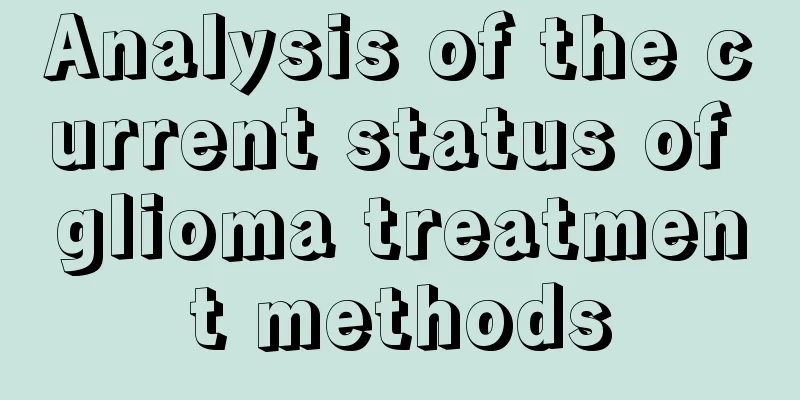Analysis of the current status of glioma treatment methods

|
What is glioma? Perhaps many people are not very clear about it. Glioma is a common tumor cell disease in clinical practice. Once the disease progresses, it will have a great impact on the patient's brain nerves. In order to let more people understand glioma, let's analyze what glioma is and the current status of its treatment methods. Glioma is a type of tumor with very special tumor cell origin, pathological structure, biological characteristics and clinical symptoms. The incidence of brain glioma is 3-10/100,000, accounting for 1%-3% of all malignant tumors in the body. The survival period after treatment is 8-11 months after tumor onset. The growth characteristics of gliomas are infiltrative growth, with no obvious boundaries from normal brain tissue. Most of them are not limited to one lobe of the brain, and they penetrate deeply into the brain tissue in a finger-like manner. Glioma occurring in the cerebral hemisphere accounts for about 51.4% of all gliomas, with astrocytoma being the most common, followed by glioma and oligodendroglioma. The ventricular system is also a common site for gliomas, accounting for 23.9% of the total number of gliomas, mainly tunica, medulloblastoma, astrocytoma, and cerebellar glioma accounts for 13% of the total number of gliomas, mainly astrocytoma. Glioma is not without symptoms. Usually, when doctors say there are no symptoms, they are mainly about the lack of motor, language, sensory and visual field damage. After careful examination, it is found that 30-50% of patients have cognitive dysfunction, such as memory, emotion, decision-making, judgment, working memory and other aspects. This also shows from another perspective that low-grade gliomas cannot wait for observation, but need active treatment to relieve the aggravation of symptoms. Benign gliomas grow slowly and have a long course of disease, with an average of two years from the onset of symptoms to the time of medical treatment. Malignant gliomas grow quickly and have a short course of disease, with most cases taking less than three months from the onset of symptoms to the time of medical treatment, and 70-80% taking less than half a year. Early detection and treatment of brain gliomas can prolong the patient's life. Specific treatment methods are as follows: Surgery: Surgical treatment is based on the growth characteristics of gliomas. Theoretically, it is impossible to completely remove them by surgery. Some tumors growing in important parts such as the brainstem cannot be operated on at all. Therefore, the indications for surgery are: reducing tumor volume, reducing the number of tumor cells, improving symptoms, relieving symptoms of high intracranial pressure, and prolonging life. Radiotherapy: Radiotherapy is almost the routine treatment for all types of gliomas, but the evaluation of the efficacy varies. Except for medulloblastoma, which is highly sensitive to radiotherapy, and ependymoma, which is moderately sensitive, other types are not sensitive to radiotherapy. Some observations believe that the prognosis of radiotherapy and non-radiotherapy is the same. In addition, the impact of radiation-induced radiation necrosis on brain function should not be underestimated. Chemotherapy: In principle, it is used for malignant tumors, but chemotherapy drugs are limited by the blood-brain barrier and drug toxicity and side effects, and the efficacy is still uncertain. Commonly used BCNU, CCNU, VM-26, etc. have an effective rate of less than 30%. γ-knife - both belong to the category of radiotherapy. Due to the location of the tumor, the size of the tumor (generally limited to less than 3 cm) and the sensitivity of the tumor to radiation, the scope of treatment is limited. It is currently believed that gliomas, especially malignant astrocytic grade III-IV or glioblastomas, are not suitable for R-knife treatment. |
<<: What are the treatments for thyroid cancer?
>>: What are the preventive measures for pituitary tumors
Recommend
Be alert if the pulse is below 60
The normal pulse rate of a person is about 60 to ...
What to do if there is too much scale in tap water
It is easy for scale to hide in water pipes, and ...
Metronidazole tablets treat periodontitis, pharmacology is the most important
Metronidazole is indeed effective in treating per...
The efficacy of garnet
Garnet is a very common gemstone. Garnet has many...
What are some quick ways to lose weight without taking medicine
How to lose weight quickly without taking medicin...
What to do about tinnitus caused by nasopharyngeal cancer and how to treat it
What should I do if I have tinnitus due to nasoph...
Early symptoms of syphilis
As society becomes more and more open, relationsh...
Key points for the diagnosis of lymphoma
The key points for diagnosing lymphoma are as fol...
Why does lung cancer cause sweating? One of the common symptoms
Lung cancer is one of the serious diseases and ma...
Differential diagnosis of mediastinal teratoma
Most teratomas are located in the anterior medias...
Is chest pain when eating a sign of esophageal cancer? There is a certain possibility
When eating, the patient has chest pain, which is...
What's causing the pain in my forehead?
Modern people's health awareness is gradually...
Precautions for postoperative health care of lung cancer patients
Lung cancer is a common tumor of the respiratory ...
Why do I sweat easily when I have a cold
Colds are very common diseases in normal times, a...
Get back in shape after childbirth
In order to provide sufficient nutrition for the ...









